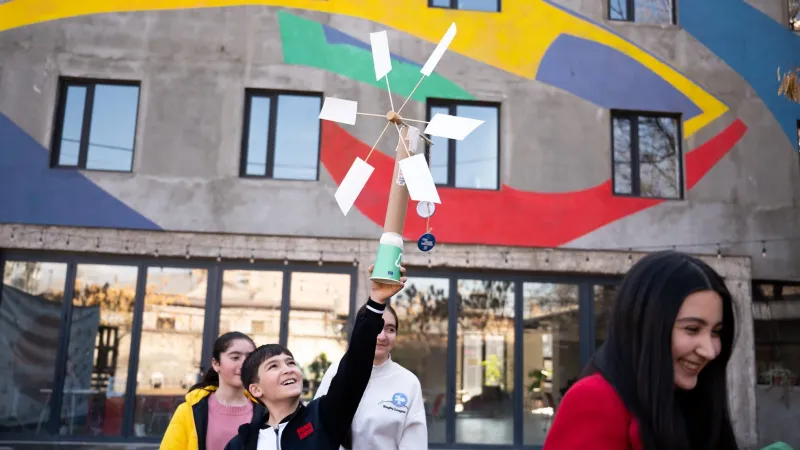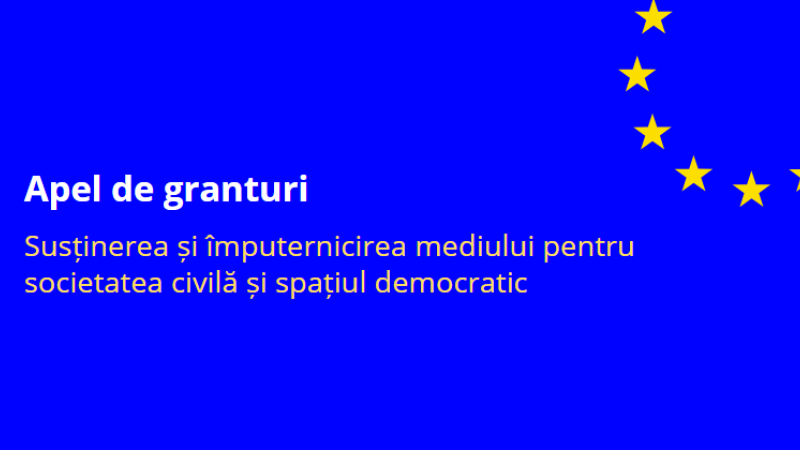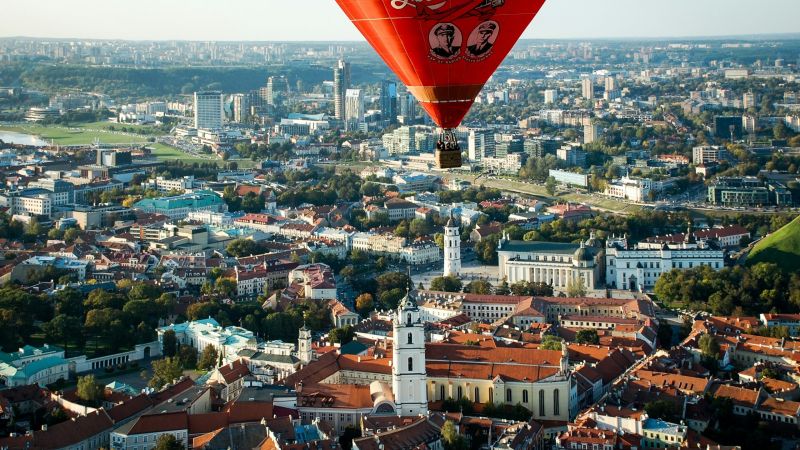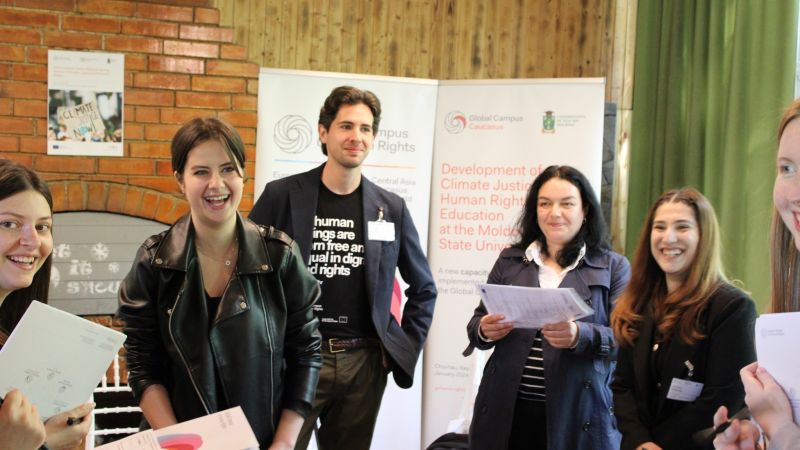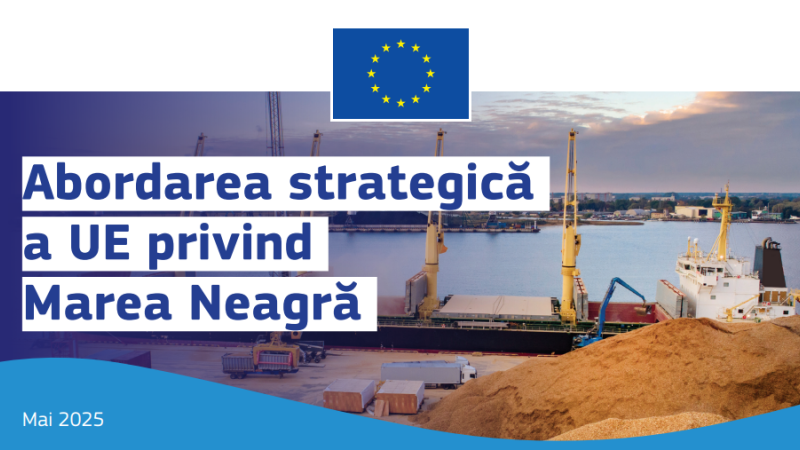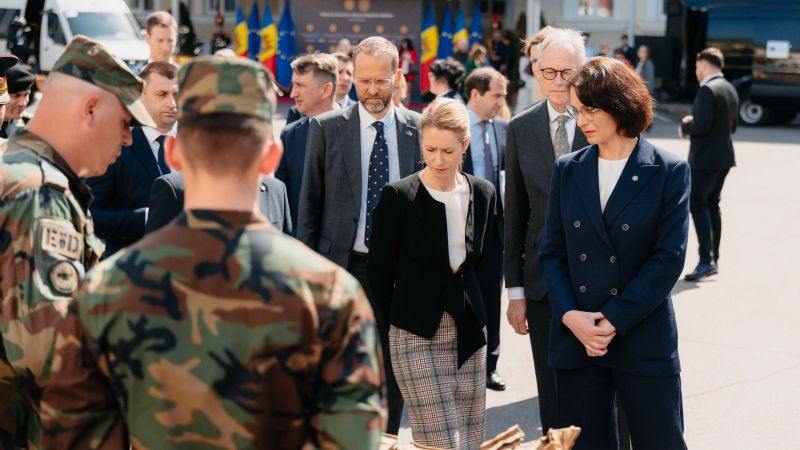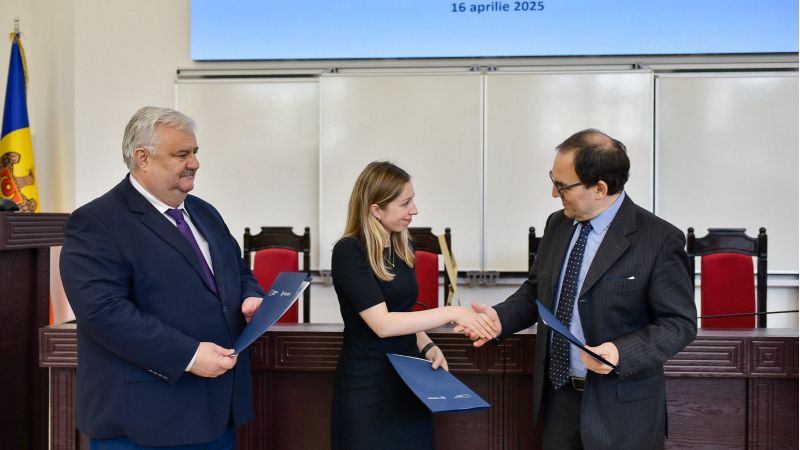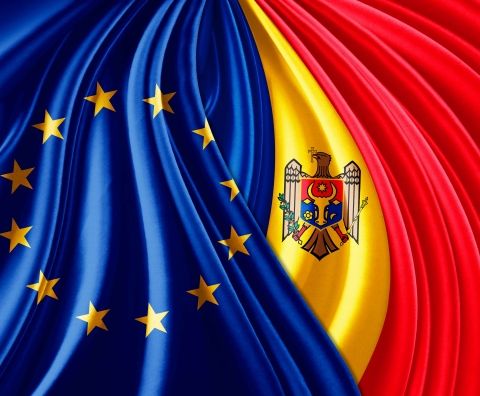
Cererea de aderare a Republicii Moldova la Uniunea Europeană – pași următorii și provocări
Proiectul finanțat de Uniunea Europeană „Sprijin pentru dialogul politic structurat, coordonarea implementării Acordului de Asociere (AA) și îmbunătățirea procesului de aproximare legală” oferă sprijin pentru creșterea capacităților Guvernului Republicii Moldova și a altor instituții naționale cheie în implementarea Acordului de Asociere UE-Republica Moldova. În contextul solicitării de aderare la UE, echipa de proiect va continua să obțină rezultatele necesare pentru a sprijini instituțiile relevante să își îndeplinească angajamentele și obligațiile aferente AA.
Republica Moldova și-a depus oficial cererea de aderare la Uniunea Europeană la 3 martie 2022. Acest pas marchează o schimbare semnificativă în relațiile dintre Republica Moldova și UE, întrucât și Republica Moldova a demarat în mod oficial procesul de aderare la UE. Această evoluție a relațiilor va avea un efect semnificativ asupra cerințelor UE pentru Republica Moldova și asupra abordării Republicii Moldova față de Uniunea Europeană. Chiar dacă Acordul de asociere existent între Republica Moldova și UE este foarte exigent, cererea de aderare a Republicii Moldova va ridica cerințele la un nivel superior.
Aderarea la UE
Prezenta cerere este depusă în temeiul articolului 49 din Tratatul privind Uniunea Europeană (TUE), care prevede că „orice stat european care respectă valorile menționate la articolul 2 și care se angajează să le promoveze poate solicita să devină membru al Uniunii”.
Articolul 2 din TUE definește aceste valori, precizând că „Uniunea se întemeiază pe valorile respectării demnității umane, libertății, democrației, egalității, statului de drept, precum și pe respectarea drepturilor omului, inclusiv a drepturilor persoanelor care aparțin minorităților. Aceste valori sunt comune statelor membre într-o societate în care prevalează pluralismul, nediscriminarea, toleranța, justiția, solidaritatea și egalitatea între femei și bărbați”.
Orice potențial viitor stat membru al UE va fi evaluat în funcție de aceste valori. Capacitatea țării de a-și demonstra disponibilitatea de a acționa în conformitate cu aceste valori va fi esențială pentru aderarea la UE. Întrucât, în esența sa, UE este cel mai mare proiect european de pace din toate timpurile, împărtășirea și promovarea acestor valori comune devine deosebit de importantă în lumina războiului din Ucraina și a altor amenințări la adresa păcii europene.
După primirea cererii Moldovei, Consiliul a invitat deja Comisia Europeană să prezinte avizul său privind cererea Moldovei, ca prim pas al UE în procesul de aderare. Pentru a putea redacta un astfel de Aviz, Comisia va prezenta un Chestionar detaliat Republicii Moldova. Pe baza răspunsurilor la Chestionar, care au fost elaborate și transmise de către Republica Moldova, Comisia va emite avizul său și, cel mai probabil, va:
- va recomanda acordarea statutului de țară Candidată pentru Moldova și posibilitatea Moldovei de a începe negocierile de aderare sau –
- va recomanda acordarea statutului de Candidat, dar numai după îndeplinirea unor condiții specifice de către Moldova.
Statele Membre ale UE vor lua o decizie cu privire la cererea Moldovei, hotărând în unanimitate, pe baza Avizului Comisiei. Odată ce Republica Moldova va primi statutul de țară Candidată, va fi stabilită data deschiderii negocierilor de aderare la UE (cel mai probabil după ce Republica Moldova va îndeplini condiții suplimentare). Negocierile de aderare vor fi purtate până când țara va îndeplini toate cerințele de aderare la UE, în special cerințele privind criteriile politice, deoarece valorile fundamentale ale UE, astfel cum sunt definite la articolul 2 din TUE, sunt evaluate în cadrul criteriilor politice. Odată ce se convine asupra condițiilor de aderare a Republicii Moldova, Tratatul de Aderare este negociat, aprobat și semnat de Moldova și de toate Statele Membre ale UE și este stabilită data aderării.
Se preconizează că Republica Moldova va organiza un referendum în care cetățenii săi vor trebui să se pronunțe în privința aderării Republicii Moldova la Uniunea Europeană.
Tratatul de Aderare trebuie să fie aprobat de Parlamentul European și ratificat de Republica Moldova, precum și de parlamentul național al fiecărui Stat Membru al UE înainte de intrarea sa în vigoare.
După cum s-a menționat mai sus, Chestionarul Comisiei este primul pas crucial în procesul de aderare la UE, care va demonstra disponibilitatea Republicii Moldova de a reacționa prin răspunsuri prompte și precise. Chestionarul ar trebui să fie perceput ca o imagine a Republicii Moldova la momentul specific al trimiterii răspunsului, nici mai mult, nici mai puțin.
Ultimele Chestionare elaborate pentru țările din Balcanii de Vest conțineau 2500-3000 de întrebări fiecare. Acestea au reprezentant un instantaneu a modului în care funcționa fiecare țară și cât de aproape era fiecare țară de îndeplinirea cerințelor de aderare la UE în momentul în care au trimis răspunsurile la Chestionar (Chestionarul și răspunsurile Republicii Serbia pot fi consultate la următorul link: https://www.mei.gov.rs/eng/documents/national-documents/answer-to-the-european-commisions-questionnaire, chestionarul și răspunsurile Bosniei și Herțegovinei pot fi consultate la următorul link: https://www.dei.gov.ba/en/odgovori-na-upitnik-ek).
Republica Moldova s-ar putea aștepta ca numărul de întrebări să fie mai mare, pentru a se potrivi circumstanțelor specifice ale țării. Întrebările vor fi multistratificate și vor necesita implicarea întregii administrații de stat și numeroase consultări între diverse instituții de stat. Ulterior, vor fi trimise întrebări suplimentare de monitorizare pentru a clarifica răspunsurile Republicii Moldova. Răspunsurile vor oferi Comisiei Europene o imagine clară a pregătirii Moldovei de a purta negocierile de aderare și a capacităților administrației Moldovei. Incapacitatea de a răspunde la o întrebare sau timpul prea îndelungat de transmitere a răspunsurilor la chestionar va fi, de asemenea, un indiciu al lipsei de capacități a Republicii Moldova.
Structura Chestionarului
Chestionarul va fi structurat astfel încât să respecte formatul negocierilor de aderare, care sunt organizate astfel încât să includă criteriile de aderare de la Copenhaga din 1993:
1) criterii politice: stabilitatea instituțiilor care garantează democrația, statul de drept, drepturile omului și respectarea și protecția minorităților;
2) criterii economice: o economie de piață funcțională și capacitatea de a face față concurenței și forțelor pieței; și
3) capacitatea de a-și asuma obligațiile care rezultă din calitatea de membru al UE, inclusiv capacitatea administrativă și instituțională de a pune în aplicare în mod eficient întregul acquis al UE (organizat în peste 30 de capitole de negociere).
Pentru ca Republica Moldova să fie pregătită să răspundă la Chestionar într-un mod coerent și organizat (precum și pentru a fi pregătită pentru negocierile ulterioare de aderare) și să vorbească „cu o singură voce”, administrația ar trebui să-și organizeze activitatea astfel încât să reflecte structura întrebărilor adresate de Comisia Europeană. Aceasta presupune că Moldova va trebui să își organizeze eforturile pentru a răspunde la chestionar în conformitate cu structura criteriilor de la Copenhaga (criterii politice, criterii economice și peste 30 de capitole de negociere). Pentru capitolele „Criterii politice și economice” și pentru fiecare capitol de negociere, ar fi necesar să se stabilească o instituție principală și ar trebui identificate toate instituțiile legate de conținutul criteriilor/capitolelor. O astfel de reorganizare internă a procesului de coordonare va fi utilă pentru Moldova și în timpul negocierilor ulterioare de aderare.
Acest proces de coordonare reorganizat, care este aliniat în funcție de structura capitolelor de negociere, nu necesită instituții și persoane noi. Cu toate acestea, reorganizarea structurilor de coordonare existente în noile grupuri de lucru ar trebui să se realizeze în următoarele câteva luni, în timp ce Moldova așteaptă chestionarul. Instituțiile din afara Guvernului, cum ar fi Parlamentul, sistemul judiciar, agențiile de stat, Ombudsmanul etc., ar trebui, de asemenea, să fie incluse în procesul de elaborare a chestionarului.
Întrebările primite ar trebui să fie împărțite între instituțiile din cadrul grupurilor de lucru nou-înființate (care vor fi transformate ulterior în grupuri de negociere), astfel încât toate organismele/actorii competenți să își poată aduce contribuția la fiecare întrebare în parte. Răspunsul la o singură întrebare poate necesita activitatea mai multor instituții care trebuie să cadă de acord și să ofere un răspuns comun și unitar la întrebarea respectivă. Toate răspunsurile din cadrul unui capitol ar trebui să fie sincronizate și ar trebui definit un răspuns comun pentru întregul capitol. Toate capitolele ar trebui să fie sincronizate de către instituția care conduce întregul proces. Răspunsurile finale ar trebui să fie adoptate de către Guvern și apoi trimise Comisiei Europene de la Bruxelles. Răspunsurile la toate întrebările pot însuma aproximativ 8.000-10.000 de pagini.
Experiența din Balcanii de Vest indică faptul că a fost nevoie de 6-12 luni pentru a răspunde la Chestionar, iar structurile administrative necesare au fost stabilite înainte de acest interval de timp.
De asemenea, toate răspunsurile (care vor fi pregătite mai întâi în limba română) trebuie să fie traduse apoi de către Republica Moldova într-o limbă engleză de înaltă calitate. În cazul în care traducerea nu este făcută în mod corespunzător, calitatea răspunsurilor Republicii Moldova va avea de suferit și/sau va fi inexactă. În plus, toată legislația Republicii Moldova (în primul rând legile și unele regulamente) care stau la baza răspunsurilor trebuie, de asemenea, să fie tradusă în limba engleză și atașată la răspunsuri. Prin urmare, Guvernul Republicii Moldova ar trebui să înființeze un serviciu/unitate de traducere care să coordoneze și să asigure traducerea de calitate a răspunsurilor la chestionar și a legislației relevante și, ulterior, pentru toate documentele legate de negocierile de aderare.
Cererea de aderare la UE și Chestionarul care rezultă din aceasta vor reprezenta o provocare pentru Republica Moldova, deoarece aceasta reprezintă începutul unui nivel complet diferit și mai larg de relații cu Uniunea Europeană. Acest pas este necunoscut și nou. Cu toate acestea, experiențele anterioare ale multor țări (inclusiv ale tuturor noilor state membre ale UE din Europa Centrală și de Est, precum și ale majorității țărilor din Balcanii de Vest) care au răspuns la chestionar reprezintă o sursă pentru multe lecții învățate.
Din 2014, Republica Moldova implementează un Acord de Asociere cu Uniunea Europeană. Dacă va exista sprijinul politic necesar (care să recunoască faptul că răspunsul la viitorul Chestionar este o prioritate strategică pentru Republica Moldova) și dacă toate pregătirile administrative necesare vor fi efectuate în lunile următoare (inclusiv înființarea grupurilor de lucru și organizarea procesului de traducere), atunci nu există motive să ne îndoim că Republica Moldova poate îndeplini această etapă cu la fel de mult succes ca multe dintre țările anterioare.
Proiectul de asistență tehnică finanțat de UE „Sprijin pentru dialogul politic structurat, coordonarea implementării Acordului de asociere (AA) și îmbunătățirea procesului de aproximare legală în Republica Moldova” poate oferi sprijinul necesar, pe baza experienței acumulate în urma răspunsurilor la ultimul Chestionar, precum și pe baza reorganizării interne din diferite țări din Balcanii de Vest.
